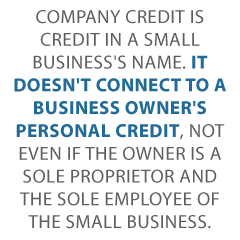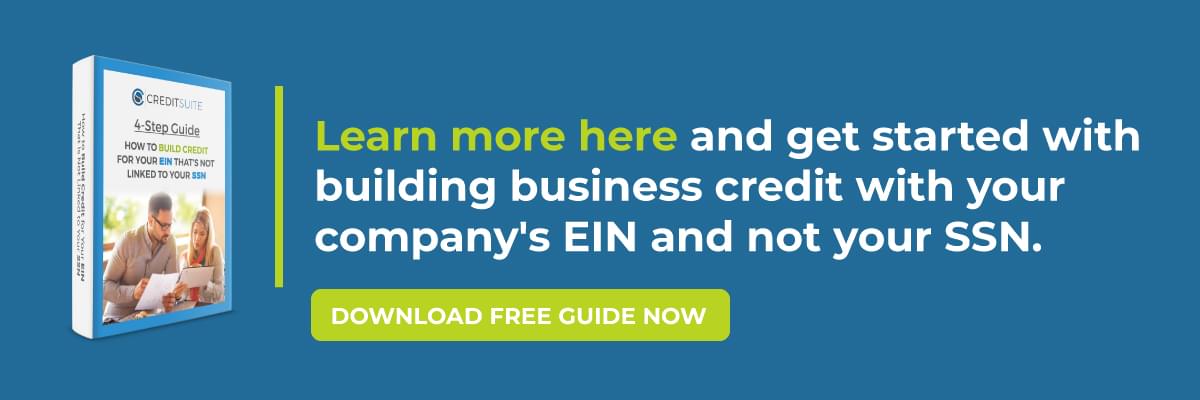
Is it Possible to Get Business Funding for Bad Credit?
Do you need business funding for bad credit? You may feel that – or you may have heard – that you can’t get business funding for bad credit.
The best, easiest, and fastest way to do so is to build business credit. Because then your bad credit won’t matter quite so much.
Any Small Business Can Get Business Funding for Bad Credit
Company credit is credit in a small business’s name. It doesn’t connect to a business owner’s personal credit, not even if the owner is a sole proprietor and the sole employee of the small business.
Consequently, an entrepreneur’s business and consumer credit scores can be quite different.
The Advantages of Business Funding for Bad Credit
Considering that business credit is separate from consumer, it helps to secure a business owner’s personal assets, in case of court action or business bankruptcy.
Also, with two distinct credit scores, an entrepreneur can get two separate cards from the same merchant. This effectively doubles purchasing power.
Another advantage is that even startup businesses can do this. Going to a bank for a business loan can be a formula for disappointment. But building business credit, when done the right way, is a plan for success
Consumer credit scores depend on payments but also various other components like credit use percentages.
But for business credit, the scores really merely depend on if a small business pays its bills on a timely basis.
The Process
Establishing company credit is a process. It does not occur automatically. A company must actively work to build business credit.
Having said that, it can be done readily and quickly, and it is much swifter than developing personal credit scores.
Merchants are a big part of this process.
Accomplishing the steps out of order results in repetitive denials. No one can start at the top with business credit. For example, you can’t start with retail or cash credit from your bank. If you do, you’ll get a rejection 100% of the time.
Business Fundability
A small business must be fundable to loan providers and vendors.
Therefore, a business needs a professional-looking website and email address. And it needs to have website hosting bought from a vendor like GoDaddy.
In addition, business phone numbers need to have a listing on 411. You can do that here: http://www.listyourself.net.
In addition, the company phone number should be toll-free (800 exchange or the like).
A small business also needs a bank account devoted only to it, and it has to have all of the licenses necessary for running.
Licenses
These licenses all have to be in the identical, correct name of the small business. And they must have the same business address and telephone numbers.
So note, that this means not just state licenses, but possibly also city licenses.
Learn more here and get started with building business credit with your company’s EIN and not your SSN.
Working with the Internal Revenue Service
Visit the Internal Revenue Service web site and get an EIN for the company. They’re free. Pick a business entity such as corporation, LLC, etc.
A business may get started as a sole proprietor. But they absolutely need to switch to a sort of corporation or an LLC.
This is to lessen risk. And it will maximize tax benefits.
A business entity matters when it involves tax obligations and liability in case of a lawsuit. A sole proprietorship means the owner is it when it comes to liability and tax obligations. Nobody else is responsible.
The best thing to do is to incorporate. You should only look at a DBA as an interim step on the way to incorporation.
Kicking Off the Business Credit Reporting Process
Begin at the D&B web site and get a cost-free D-U-N-S number. A D-U-N-S number is how D&B gets a company in their system, to produce a PAYDEX score. If there is no D-U-N-S number, then there is no record and no PAYDEX score.
Once in D&B’s system, search Equifax and Experian’s websites for the company. You can do this at www.creditsuite.com/reports. If there is a record with them, check it for accuracy and completeness. If there are no records with them, go to the next step in the process.
By doing this, Experian and Equifax have activity to report on.
Starter Vendor Credit
First you ought to establish tradelines that report. Then you’ll have an established credit profile, and you’ll get a business credit score.
And with an established business credit profile and score you can begin to get credit for numerous purposes, and from all sorts of places.
These sorts of accounts often tend to be for things bought all the time, like marketing materials, shipping boxes, outdoor work wear, ink and toner, and office furniture.
But first off, what is trade credit? These trade lines are credit issuers who give you starter credit when you have none now. Terms are in most cases Net 30, rather than revolving.
Therefore, if you get approval for $1,000 in vendor credit and use all of it, you need to pay that money back in a set term, such as within 30 days on a Net 30 account.
Details
Net 30 accounts must be paid in full within 30 days. 60 accounts must be paid fully within 60 days. Unlike revolving accounts, you have a set time when you have to pay back what you borrowed or the credit you made use of.
To start your business credit profile the proper way, you ought to get approval for vendor accounts that report to the business credit reporting bureaus. As soon as that’s done, you can then make use of the credit.
Then pay back what you used, and the account is on report to Dun & Bradstreet, Experian, or Equifax.
Vendor Credit – It Makes Sense
Not every vendor can help in the same way true starter credit can. These are merchants that grant approval with minimal effort. You also want them to be reporting to one or more of the big three CRAs: Dun & Bradstreet, Equifax, and Experian.
As you get starter credit, you can also start to get credit from retailers. This is to continue to validate you are trustworthy and pay promptly. Here are some stellar choices from us: https://www.creditsuite.com/blog/5-vendor-accounts-that-build-your-business-credit/
Accounts That Do Not Report
Non-reporting trade accounts can also be helpful. While you do want trade accounts to report to at the very least one of the CRAs, a trade account which does not report can also be of some value.
You can always ask non-reporting accounts for trade references. Additionally, credit accounts of any sort can help you to better even out business expenditures, thereby making financial planning less complicated.
Store Credit
Store credit comes from a variety of retail service providers.
You must use your SSN and date of birth on these applications for verification purposes. For credit checks and guarantees, use the business’s EIN on these credit applications.
Fleet Credit
Fleet credit is from companies where you can purchase fuel, and fix and take care of vehicles. You must use your Social Security Number and date of birth on these applications for verification purposes. For credit checks and guarantees, make certain to apply using the company’s EIN.
Learn more here and get started with building business credit with your company’s EIN and not your SSN.
More Universal Cash Credit
These are companies like Visa and MasterCard. You must use your Social Security Number and date of birth on these applications for verification purposes. For credit checks and guarantees, use your EIN instead.
These are usually MasterCard credit cards. With more credit, these are within reach.
Monitor Your Business Credit to Help Yourself Get Business Funding for Bad Credit
Know what is happening with your credit. Make sure it is being reported and fix any inaccuracies as soon as possible. Get in the habit of checking credit reports. Dig into the details, not just the scores.
We can help you monitor business credit at Experian and D&B for 90% less than it would cost you at the CRAs. See: www.creditsuite.com/monitoring.
At Equifax, you can monitor your account at: www.equifax.com/business/business-credit-monitor-small-business.
Update Your Records to Make it Easier to Get Business Funding for Bad Credit
Update the data if there are errors or the details is incomplete. At D&B, you can do this at: https://iupdate.dnb.com/iUpdate/viewiUpdateHome.htm. For Experian, go here: www.experian.com/small-business/business-credit-information.jsp. So, for Equifax, go here: www.equifax.com/business/small-business.
Learn more here and get started with building business credit with your company’s EIN and not your SSN.
Fix Your Business Credit to Increase Your Chances for Getting Business Funding for Bad Credit
So, what’s all this monitoring for? It’s to challenge any mistakes in your records. Errors in your credit report(s) can be fixed. But the CRAs typically want you to dispute in a particular way.
Get your small business’s PAYDEX report at: www.dnb.com/about-us/our-data.html. Get your company’s Experian report at: www.businesscreditfacts.com/pdp.aspx?pg=SearchForm. And get your Equifax business credit report at: www.equifax.com/business/credit-information.
Dispute Any Errors to Improve Your Chances to Get Business Funding for Bad Credit
Disputing credit report mistakes generally means you mail a paper letter with copies of any proofs of payment with it. These are documents like receipts and cancelled checks. Never mail the originals. Always send copies and retain the originals.
Fixing credit report inaccuracies also means you precisely detail any charges you contest. Make your dispute letter as crystal clear as possible. Be specific about the problems with your report. Use certified mail to have proof that you mailed in your dispute.
Dispute your or your business’s Equifax report by following the instructions here: www.equifax.com/small-business-faqs/#Dispute-FAQs.
You can dispute inaccuracies on your or your small business’s Experian report by following the instructions here: www.experian.com/small-business/business-credit-information.jsp.
And D&B’s PAYDEX Customer Service telephone number is here: www.dandb.com/glossary/paydex.
A Word about Building Business Credit and How to Get Business Funding for Bad Credit
Always use credit smartly! Don’t borrow beyond what you can pay off. Track balances and deadlines for payments. Paying promptly and completely does more to boost business credit scores than almost anything else.
Establishing business credit pays. Excellent business credit scores help a small business get loans. Your loan provider knows the business can pay its debts. They recognize the company is for real.
The company’s EIN connects to high scores and lenders won’t feel the need to ask for a personal guarantee.
It is the simplest way to get business funding for bad credit.
Getting Business Funding for Bad Credit: Takeaways
Business credit is an asset which can help your small business for many years to come. It is the most surefire way to get business funding for bad credit. And, while you’re at it and improving your business credit, you may want to work on improving your personal credit. It is a similar process in the sense that you need to pay your bills on time, correct any errors, and add any missing information.
Because one way around trying to get business funding for bad credit is to stop having bad credit in the first place.
Learn more here and get started toward growing company credit.
The post Is it Possible to Get Business Funding for Bad Credit? appeared first on Credit Suite.

